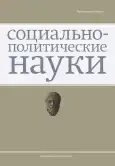The system model and the law of the crisis of trust in conditions of transforming economic relations
- Authors: Zelenkov M.Y.1, Tyurikov A.G.1, Zhang W.1
-
Affiliations:
- Financial University
- Issue: Vol 12, No 2 (2022)
- Pages: 72-78
- Section: Articles
- URL: https://journals.eco-vector.com/2223-0092/article/view/535778
- DOI: https://doi.org/10.33693/2223-0092-2022-12-2-72-78
- ID: 535778
Cite item
Abstract
Full Text
About the authors
Mikhail Yu. Zelenkov
Financial University
Email: myzelenkov@fa.ru
Dr. Sci. (Polit.), Associate Professor; leading researcher Moscow, Russian Federation
Alexander G. Tyurikov
Financial University
Email: agtyurikov@fa.ru
Dr. Sci. (Sociol.), Professor; Head at the Department of Sociology Moscow, Russian Federation
Wen Zhang
Financial University
Email: misteri1953@mail.ru
PhD student at the Department of Sociology of the Faculty of Social Sciences and Mass Communications Moscow, Russian Federation
References
- Luhmann N. Trust and power. Wiley, Chichester, 1979. 208 p.
- Gustafsson S., Gillespie N., Hope Hailey V. et al. Preserving organizational trust during disruption // Organization Studies. Epub ahead of print. April 27, 2020. doi: 10.1177/0170840620912705.
- Gross N. A pragmatist theory of social mechanisms // American Sociological Review. 2009. No. 74. Pp. 358-379.
- Vakhtina M. Whether the trust is sign of institute? // Journal of economic regulation. 2018. Vol. 9. No. 3. Pp. 22-36.
- Mill J. Fundamentals of political economy with some applications to social philosophy. Moscow: Ecsmo, 2007. 1040 p.
- Keynes J.M. The general theory of employment, interest and money // The Quarterly Journal of Economics. 1937. 190 p.
- Living, working and COVID-19. European foundation for the improvement of living and working conditions [Электронный ресурс]. URL:https://www.eurofound.europa.eu/publications/report/2020/living-working-and-covid-19 (дата обращения: 23.01.2022).
- Rothstein B., Uslaner E. All for all: Equality, corruption, and social trust // World Politics. 2005. No. 58 (1). Pp. 41-72.
- Sztompka P. Confidence in the era of globalization. Social Policy and Sociology. 2006. No. 4. Pp. 8-15. (In Rus.)
- Uslaner E.M. Varieties of trust // Eur. Polit. Sci. 2003. No. 2. Pp. 43-49.
Supplementary files











